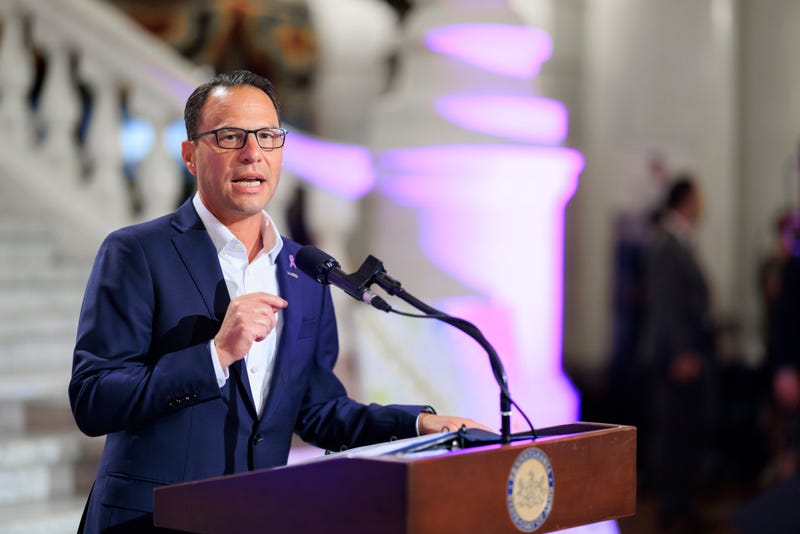
HARRISBURG, Pa. (KYW Newsradio) — Gov. Josh Shapiro’s second budget proposes a $48 billion budget that holds the line on taxes and provides more for schools, SEPTA, and economic development, and would regulate adult-use marijuana, while leaning heavily on Pennsylvania’s flush reserves to underwrite his vision.
The Democrat on Tuesday unveiled his budget for the 2024-25 fiscal year, which begins on July 1, in front of a joint session of the House and Senate in the ornate Capitol Rotunda.
Referring to his inaugural spending plan as a “down payment” on his vision for Pennsylvania, Shapiro called on lawmakers to enact his projected $48.3 billion budget to inject more cash into underfunded public schools and attract major industrial and high-tech projects to invigorate a slow-growing economy.
Education
In particular, Shapiro said a hefty $1.1 billion increase to K-12 public education would take seriously last year’s Commonwealth Court ruling that found the state’s school funding system unconstitutional. A significant portion of that would go toward getting poorer schools up to adequacy. Philadelphia schools, facing a $407 million deficit next year, would get a $247 million boost.
Shapiro also revived the voucher proposal that created a budget impasse last year when House Democrats balked. In his address, the governor said progress requires difficult discussions.
“One of those conversations will need to be about scholarships that let poor families in struggling school districts put their kids in the best position for them to succeed – whether that is paying for extra tutoring, books and computers, or yes, going to another school.”
Pennsylvania lags nearly every other state in funding higher education. To bolster students continuing through post-secondary, Shapiro’s budget allots an extra $200 million, or 10%, more for the state’s higher education institutions.
Mass transit
The governor’s budget would increase the share of the state sales tax that goes to mass transit, providing $283 million more for transit systems across the state. SEPTA would receive an additional $161 million.
“I insisted they address concerns about cleanliness and safety, and I asked the local counties whose residents benefit from that system, to meet this moment with additional support,” Shapiro said. “This will trigger an automatic match of 15% from local counties, raising another $24 million for the system this year.”
SEPTA general manager Leslie Richards said the additional cash will help the transit agency avoid a $240 million fiscal cliff.
“It’s going to be huge. It’s going to allow us to provide service to this area to keep everybody moving without service cuts and without fare increases,” Richards said.
“This is money that is dedicated, moving forward. It’s a percentage of the sales tax, which will continue coming to all of the transit agencies in the commonwealth — which the largest portion will come to SEPTA — and this will allow us to plan for the future,” she said.
Paying for it
The budget would use about $3 billion in reserve cash to balance, with tax collections projected to increase by $1 billion, or 2.2%. Shapiro’s spending request would increase total authorized spending by 7% through the state’s main bank account.
The proposal would hold the line on taxes on income and sales, the state’s two largest sources of income, while public schools, higher education, public transit and human services would absorb much of the increase in spending.
Shapiro said his spending plan does not require a tax increase, but it would spend some money from the state’s surplus.
“We’ve got a $14 billion surplus. We’re facing real challenges in education and with our workforce that will hold us back in the future if we don’t take action right now,” Shapiro said.
“Even if we fund every single one of the initiatives that I talked about today and is contained in my budget, we would still have an $11 billion surplus at the end of June 2025.”
As a new revenue stream, Shapiro is proposing the legalization of adult-use marijuana, following suit of Pennsylvania’s neighboring states, like Ohio, New Jersey and New York.
The governor also proposed raising Pennsylvania’s $7.25 minimum wage to $15 and regulating skill game machines often found at bars and corner stores.
Shapiro is also calling for legislators to fund economic development projects to attract major industrial and high-tech businesses to cultivate a more dynamic workforce.
“We need to build a more competitive Pennsylvania that starts in our classrooms, runs through our union halls and our small businesses, through our farmlands and our high rises, our college campuses, and leads to a life of opportunity and a retirement with dignity,” Shapiro said in his prepared remarks.
Republicans respond
Shapiro’s budget received an icy response from House Republican leader Bryan Cutler.
“It will lead to overspending and irresponsible decision making, like spending down our surplus and our Rainy Day Fund, and it will lead to overpromising and under-delivering,” Cutler said.
“You’ll not just get tax increases, you’ll get brand new taxes created out of thin air. Taxes for the legalization of marijuana and games of skill,” Cutler continued.
The governor and the divided legislature have until June 30 to agree on a new budget.
The Associated Press contributed to this report.
